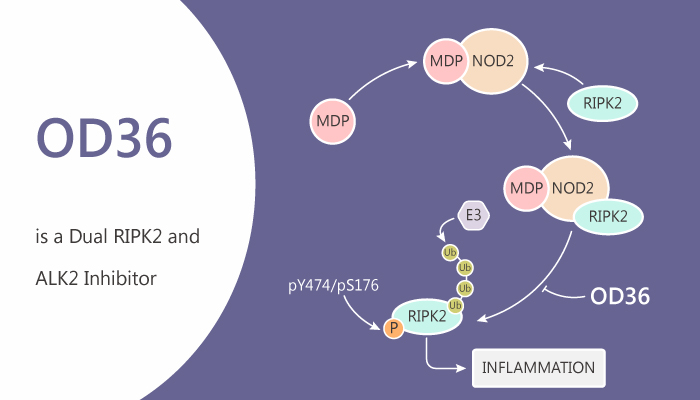Receptor Interacting Kinase 2 (RIPK2) is an adaptor kinase that targeting for the treatment of various inflammatory diseases. In addition, RIPK2 is a potential drug target, particularly in inflammatory bowel disease. RIPK2 is critical for nucleotide binding and oligomerization domain (NOD)-mediated NF-κB activation and cytokine production. OD36 displays a very strong inhibitory activity against RIPK2 and ALK2.

OD36 inhibits RIPK2 activity at low nanomolar range. In particular, OD36 inhibits both RIPK2 tyrosine autophosphorylation as well as downstream NF-κB and MAPK signaling induced by muramyl dipeptide. At 100 nM, OD36 shows very good initial specificity, inhibiting few other kinases to the same extent as RIPK2 and showing very high potency with IC50 values in the lower nanomolar range (OD36 having an IC50 of 5.3 nM). OD36 inhibits the recruitment of inflammatory cells to the peritoneum, specifically that of neutrophils, and to a lesser extent, lymphocytes. In vivo, OD36 reduces cellular infiltration in an muramyl dipeptide-induced peritonitis model.
Fibrodysplasia ossificans progressiva (FOP) is an extremely rare congenital form of heterotopic ossification. OD36 is a potent inhibitor with excellent kinase selectivity profiles that potently antagonizes mutant ALK2 signaling and osteogenic differentiation. OD36 represents a class of BMP receptor inhibitors with enhanced specificity for ALK2 kinase activity. Moreover, OD36 specifically inhibit ALK2 downstream signaling. Especially, OD36 efficiently blocks activin A‐induced osteogenic differentiation of fibrodysplasia ossificans progressiva endothelial colony-forming cells. Furthermore, OD36 inhibit activin A-induced ALK2 R206H osteogenic and chondrogenic differentiation
All in all, OD36 is a Macrocycle Kinase Inhibitors for ALK2 and also is a RIPK2 inhibitor for inflammatory disease.